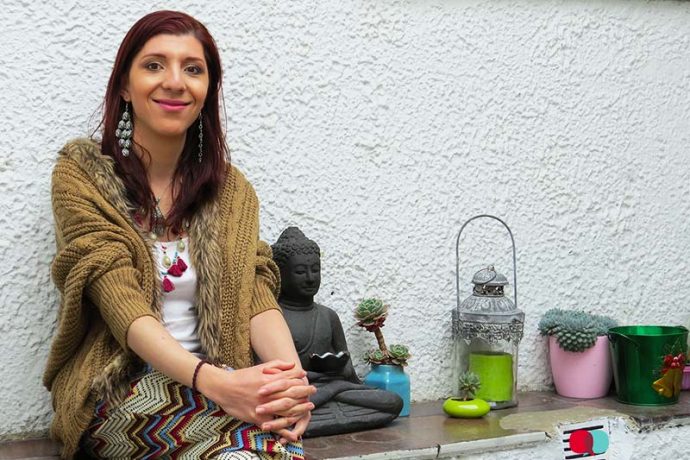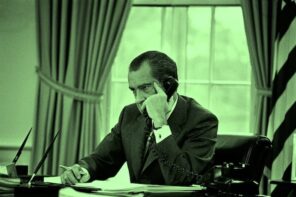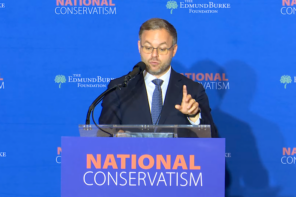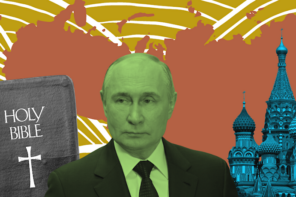The parliament of Malta, an officially Catholic country, approved marriage equality legislation with a single dissenting vote. The lone dissenter bucked his Nationalist Party’s leadership, reports AP:
Nationalist lawmaker Edwin Vassallo cited his Catholic faith and its incompatibility with what he called a “morally unacceptable” law.
“As a Christian politician I cannot leave my conscience outside the door” when voting, Vassallo said.
The Independent reported that “some 150-200 protestors gathered outside Parliament to voice their opposition to gay marriage, saying that marriage should be between a man and a woman. Protestors held that they wanted the public to know that not everybody in Malta is in favour of gay marriage.”
Unlike in many other nations where civil marriage equality has been considered, Malta’s bishops remained relatively quiet about the issue. Last month, Archbishop Charles Scicluna of Malta did speak in defense of a heteronormative understanding of marriage, saying marriage equality would be “lamentable.”
But the nation’s bishops failed to include the issue in their 2017 election letter, and even publicly distanced themselves from a newspaper ad from anti-equality Catholics that used extreme rhetoric. These actions build on their LGBT-positive record, which includes apologizing for initial support of conversion therapy and not punishing a priest who blessed a same-gender couples’ relationship.
The bishops have also listened closely to members of the Catholic LGBT groups Drachma and Drachma Parents. Indeed, Bishop Mario Grech said his encounter with parentshelped him understand the urgent need for new pastoral care of LGBT people.
Marriage equality’s passage is but the latest step for LGBT equality taken by the small island nation: it passed a law on transgender and intersex rights that is considered the gold standard in Europe; it was the first nation in Europe to ban conversion therapy; it has welcomed an openly transgender legislator; and it has witnessed true dialoguehappen between the bishops and other Catholics.
More than 90% of Maltese citizens identify as Catholic, including the prime minister, and Roman Catholicism remains the state religion in the nation’s Constitution. What happened in Malta is historic not only for the people of that nation, but for Catholics worldwide.
Celebrating marriage equality in another highly-Catholic nation is a reminder, once again, that Catholics support LGBT rights because of and not in spite of their faith.
Malta Today reported that an alliance of evangelical churches is unhappy with the law:
The amendments that will pave the way for same-sex marriage include “religious protection” in the Constitution of Malta for an “officer of a religious body”.
The Maltese Constitution already grants citizens full freedom of conscience and the right to enjoy the free exercise of religious worship.
“We would like to have the peace of mind that none of our members will be ‘forced’ to act against their conscience, seeing that Article 32(a) states that as Maltese we have ‘freedom of conscience’,” Edwin Caruana, head of TEAM (The Evangelical Alliance of Malta), said.
TEAM is seeking that members of religious organisations be accorded a right akin to ‘conscientious objection’.
“We seek that our rights to freedom of religion and freedom of conscience be respected. We are duty bound to protect our member churches, organizations, and individuals from any attempt to curb or obstruct religious freedom or freedom of conscience which are guaranteed by international human rights laws.”
Caruana said that although TEAM was aware that marriage equality will not affect religious marriage, it was still concerned about religious rights.
“As Christians we believe that according to Biblical teaching, God ordained marriage as a union between one man and one woman for the reason of love and pro-creation. As far as we are concerned no human law will ever erase this, as we believe that God does not change His principles but is constant in His decrees.
“We also recognize that we have no right to impose our beliefs on those that are not part of our Evangelical Christian churches, but on the same note, no one should have the right to impose on us a redefinition of beliefs that we have held dear for thousands of years! If this was to be imposed on us we would find it unacceptable and infringing on our rights.”
South Korea: Article examines religious opposition to LGBT equality
In advance of Seoul’s gay pride parade this past Saturday, AFP examined the religiously based opposition movement:
Thousands of people will march through Seoul to support gay rights in this Saturday’s Pride parade, and probably just as many conservative Christians urging them to “repent” their “sins”.
Religious South Koreans have been a loud fixture at the annual parade for years, holding a rival anti-homosexuality rally while trying to physically block the march.
Their presence is the most visible display of intolerance towards sexual minorities in the tradition-bound society, where religious belief is widespread and many homosexuals stay in the closet due to fear of discrimination and social isolation. . . .
Even left-leaning South Korean President Moon Jae-In—a former human rights lawyer—said he “opposed homosexuality” during a campaign debate in April.
His conservative opponent and eventual runner-up said homosexuals should be “punished severely for living against divine rules”.
Gay rights activists say that some progress has been made in recent years, with surveys showing increasing tolerance, particularly among young people, and participation at Pride surging since the first parade in 2000, when only 50 attended.
But the event’s growing profile has unnerved South Korea’s conservative Protestant church groups, which have millions of followers, enormous political lobbying power, and see homosexuality as a psychological illness to be “healed”.
The story quotes Pastor Hong Ho-Soo, secretary general of the Homosexuality Countermeasure Council for Korean Churches, accusing gay people of spreading disease and a “decadent sex culture against the teachings of the Bible.” He said public displays of homosexuality “can corrupt the minds of our children.”
The story also cites Kim Jin-Ho, a researcher at a religious think tank who calls Protestant churches “the most well-connected and well-financed lobby machine in this nation”:
Many South Korean churches took their cues from evangelical US megachurches that since the 1980s have expanded their influence through campaigns against abortion and homosexuality, Kim said.
South Korea is also home to many megachurches, including the world’s largest congregation of nearly 800,000. But their reputation has been tarnished by recent corruption scandals.
“For them, the anti-gay campaign is another way to maintain their political influence in this time of crisis,” Kim said.
Anglican Communion: Nigerian head of conservative group celebrates ‘traditional’ Anglicans in U.S.
Archbishop Nicholas Okoh, primate of Nigeria and chairman of the conservative GAFCON Primates Council, published an open letter in which he celebrated having attended the recent General Assembly of the Anglican Church of North America, the group that split from the Episcopal Church over the role of women and LGBT people in the church. He welcomed the consecration of Andy Lines as “a missionary bishop for Europe.” He said the event gave “a wonderful sense of what the Anglican Communion can become, a truly global partnership in the gospel which is able to ‘lift up its voice’ without confusion and compromise.”
Chicago was therefore a foretaste of what we can expect in Jerusalem as we gather in June 2018 on the tenth anniversary of the founding of this great movement and the publication of the Jerusalem Statement and Declaration. Our theme is ‘Proclaiming Christ Faithfully to the Nations’ and invitations will be going out this month. We look forward with great eagerness to another wonderful gathering as we come together in true communion under the Word of God and in the power of the Spirit of God. . . .
Gafcon began in 2008 as what my predeccesor, Archbishop Peter Akinola, described as a ‘rescue mission’ for the Anglican Communion. That rescue was not limited to North America. There is still much to do because history is repeating itself in other parts of the world, as the recent capitulation of the Scottish Episcopal Church to secular ideas about marriage has demonstrated.
False teaching is restless and relentless, and the Church of England itself is in grave spiritual danger. It is much to be regretted that there has been far more concern about alleged ‘boundary crossing’ than about the contempt of God’s Word that made a missionary bishop necessary. In fact, the Bishop of Edinburgh, who has strongly supported the Scottish Episcopal Church’s adoption of same sex ‘marriage’ was invited as a guest of honour to the Church of England’s July General Synod meeting.
Although the Church of England’s legal position on marriage has not changed, its understanding of sexual morality has. Same sex relationships, which were described by Lambeth Resolution I.10 of 1998 as ‘incompatible with Scripture’ now receive approval at the highest level. For example, Vicky Beeching, a singer, songwriter and activist who advocates homosexual marriage was honoured with the Archbishop Thomas Cranmer award for Worship in a ceremony at Lambeth Palace.
The need for Gafcon to safeguard the integrity and clarity of global Anglican mission is as urgent as it has ever been. Our calling is not to be conformed, but to be transformed. A watching world needs to know that Anglicans are defined first and foremost by faithfulness to the Word of God. By God’s grace, we will demonstrate that resolve as we gather in Jerusalem to be heralds of the good news of Jesus, God’s Son and our Saviour.
Chile: Religious conservatives’ anti-trans bus sparks protest, arrests
The latest stop on the international anti-trans bus tour sponsored by HazteOir and CitizenGo was in Santiago Chile, where police arrested 35 people after clashes that broke out around the “Freedom Bus.” From the Washington Blade:
Supporters and opponents of the “Freedom Bus,” which is part of a campaign that CitizenGO, a conservative Spanish organization, has launched with the support of evangelical and Catholic organizations, clashed near the presidential palace. Neo-Nazi groups are among those who reportedly took part in the protests.
A number of people were injured during the clashes. Activists also claimed they were attacked by religious groups on the street who accused them of pedophilia and used homophobic slurs against them.
The Chilean LGBTI movement has held public demonstrations for nearly two decades, but Monday’s clashes are the first time the police have made arrests at them. Representatives of sexual diversity groups accused the organizations behind the “Freedom Bus” of wanting to generate chaos, pointing to what they described as an agenda of misinformation and fear. . . .
In Chile, the campaign opposes a recent mandate from the Ministry of Education that seeks to guarantee and protect the rights of transgender children and adolescents in schools. The “Freedom Bus” traveled throughout Santiago on Tuesday and is expected to arrive in Valparaíso on Wednesday.
Marcela Aranda, director of the Christian Legislative Observatory who is the spokesperson for the “Freedom Bus” campaign in Chile, has told the press its objective is to defend parents’ rights to decide the type of education their children should receive.
A report from El Diario has more:
Conservative MP Jose Antonio Kast was insulted, beaten and given spit and eggs by groups opposed to the “Bus de la Libertad”, after holding a meeting outside Congress with the spokeswoman for the “Bus de la Libertad”, Marcela Aranda.
“Everyone has the right to express their opinion and this is what we have been doing. Expressions of intolerance and violence speak of a sick country, a country that does not understand the depth of freedom of expression,” Kast said.
For her part, Aranda, who is director of the Christian Legislative Observatory, stressed that “Chile has risen to say: ‘I educate my children'”, adding that parents have a preferential role in the education of their children, While the state has a secondary one.
“Through multiple bills they want to influence the morals, culture, mind and spirit of our children and we will not allow it,” he warned.
Russia: Chechen President Says Gay Men Should Leave Country To ‘Purify Our Blood”
Ramzan Kadryov, the intensely anti-gay president of Russia’s Muslim-majority province of Chechnya, respond to a reporter’s question about a resurgence of anti-gay persecution by denying that the country has gay people, and saying if they existed they should leave the country. From the Advocate:
Kadyrov—speaking to HBO’s Real Sports, ostensibly about a wrestling league in Chechyna, a semiautonomous republic within Russia—was confronted about his nation’s imprisonment and killing of gay and bisexual men; an unknown number have been murdered. Kadyrov was furious at the questioning by reporter David Scott: “Why does he come here? What’s the point of these questions?”
Kadyrov finally answered,”We don’t have those kinds of people here… If there are there take them to Canada… Take them far from us so we don’t have them at home… To purify our blood, if there are any here, take them.”
When pushed by Scott about the reports from the tortured gay men, Kadryov responded, “They are devils. They are for sale. They are not people.”
Kadyrov—an ally of Russian President Vladimir Putin—also made clear he views the U.S. as an enemy and said, “Even if our government was completely destroyed, our nuclear missiles would be automatically deployed. We will put the whole world on its knees and screw it from behind.”
A spokesperson for the U.S. State Department called reports of renewed extrajudicial killings “troubling”:
Novaya Gazeta, an independent Russian newspaper, on Sunday published the names of 27 men who it said authorities shot to death in the Chechen capital of Grozny on Jan. 26.
The Washington Blade has not been able to confirm reports that some of the men who were reportedly killed were gay. The Russian LGBT Network, a Moscow-based advocacy group, on Tuesday said “as far as we [are] concerned, the list of names that appeared in that publication (Novaya Gazeta) does not include homosexual people.”
“We are aware of troubling reports that security forces in the Republic of Chechnya summarily executed more than two dozen people in January,” the State Department spokesperson told the Blade in a statement. “We urge the Russian government to conduct an independent and credible investigation into the allegations.”
BuzzFeed reported that 53 members of the U.S. Congress have written to President Donald Trump asking him to denounce the anti-gay violence.
Malaysia: Gay-themed Vietnamese film canceled as insulting to Islam
Government officials stepped in at the last minute to cancel a screening of a Vietnamese film about a gay couple. More from Gay Star News:
Despite its cancellation a Malaysian Muslim non-government organization was not impressed the film was scheduled in the first place.
Hafiz Nordin chairman of Jaringan Muslimin Pulau Pinang (JMPP) said the film would offensive to the Yang Dipertua Agong. The Yang Dipertua Agong is Malaysia’s monarch and responsible for defending the sanctity of Islam.
He said the screening of such a movie would also be an insult to the Yang Dipertua Agong, who is the head of religion defending the sanctity of Islam in the country.
‘What is their intention, in promoting the movie and wanting to show it,’ Nordin told the Malaysian Insight.
‘It is as if there is an agenda to make homosexuality something acceptable.
‘We urge everyone to respect Islam as the religion of state. No Malaysian should think of bringing in such a movie.’
Turkey: Article examines role of LGBT people in pro-democracy opposition
A July 9 March for Justice was led by Kemal Kılıçdaroğlu, chair of the CHP opposition party. A CHP Alderwoman, Sedef Çakmak, the country’s first lesbian elected official, reflected on the march for KaosGL, an LGBT equality group:
The March for Justice, led by CHP Chair Kemal Kılıçdaroğlu brought together people from all walks of life, who believe in the rule of law and who believe that the independence of the judiciary is threatened.
The demands articulated by Kılıçdaroğlu during the rally yesterday show that the search for justice is also a search for democracy. This, in turn, reflects the effort to bring together the masses which it is believed can never stand together. Yet democracy is an issue which cannot be left to the hands of the politicians. At this critical point in this country, all of us need to do our share for democracy and liberties. The best case in hand is perhaps LGBTI+s present in every sector of society. They have been continuing this struggle merely with their existence for years.
Since 2009, thanks to the selfless work of the LGBTI+ movement and the individual efforts of some of the MPs, the LGBTI+ individuals’ search for justice and equality has come to be voiced more and more within the CHP. Our candidacy for city council for CHP during 2014 local elections and afterwards our work in municipalities quickly led to awareness within the party. As such, the LGBTI+ movement emerged as a political actor during the 2015 general elections.
The CHP’s increasing advocacy against the discrimination, pressure and inequality LGBTI+ individuals are subjected to is of course promising, but this can not be a one way relationship. As citizens, we need to be more present in the political parties as well as to continue articulating our rights. There were people carrying the rainbow flag on their bags and waving their rainbow umbrellas freely at the Justice March against the government’s hunt for rainbows after banning İstiklal for Pride Walk.
Colombia: Profile of trans musician and activist explores her spiritual life
Sentiido profiles Sarah Gonzalez, a musician and transgender activist whose “spiritual life is linked to a deep respect for nature, an idea enriched by Buddhist and shamanic practices.” Sarah says that struggling with her identity, she prayed to the Virgin Mary to be “fixed,” before understanding that Catholic doctrine was standing in the way of an authentic life.
Italy: Activists warn of anti-gay violence in Naples
Activists with Arcigay in Naples have sounded an alarm about a wave of disappearances and killings of LGBT people.
Uganda: Plight of LGBT refugees examined
Tonny Onyulo reported for PRI on the situation of LGBT Ugandans who have sought asylum in Kenya. Homosexuality is also illegal in Kenya, Onyulo notes, “but enforcement of the law has been more sporadic than in Uganda.”
Iraq: Activist says anti-LGBT violence sparked by western intervention
Amrou Al-Kadhi, an Iraqi living in the United Kingdom, wrote a column this month saying that deadly violence against LGBT people in Iraq had “escalated dramatically” since the Western invasion of the country in 2003. From his commentary in The Independent:
Humanitarian reports estimate that between 2004 to 2009, 680 people have been murdered due to gender and sexual non-conformism. According to Amir Ashour, the remarkable founder of IraQueer—a charity to support LGBTQI+ citizens in Iraq—queer people are publically exposed by Isis with their names and photos on walls around Baghdad. “In some parts of the country, if it is even discovered that you know a queer person, it can be very dangerous.”
Amir explained that on one of these “killing lists . . . a person’s crime was having long hair. All it takes is the perceived idea of someone’s sexuality, or the perceived idea of someone’s gender expression,” for them to be murdered. The “offender” Amir refers to was a married heterosexual man with kids, whose slight variation of male propriety resulted in his execution.
Estonia: First pride march since violence disrupted event a decade ago
On July 8, about 1800 people took part in the first gay pride march in the capital city of Tallinn in a decade. In 2007, AFP reports, the march “descended into chaos” when “participants were attacked with stones and beaten by opponents.”
Czech Republic: ‘We are fair’ campaign hopes to spark debate on marriage equality
Earlier this month, activists in the Coalition for Marriage (KZM) launched a “We Are Fair” campaign to encourage discussion of marriage equality. They hope that Germany’s move to legalize marriage for same-sex couples would help their cause. Same-sex couples have been able to register their partnerships since 2006. According to the Czech News Agency, a May poll found that 52 percent of Czechs support same-sex marriage.
India: Profile of author whose stories in local language speak to isolated LGBT people
Reuters profiles author Vasudhendra, who wrote stories about the life of his gay protagornist Mohandaswarmy for years before the author publicly came out himself. He tells Reuters that his stories, published in the regional language of the state of Karnataka, were initially written under a pseudonym, but that when he came out he heard from gay men living in small towns and villages who felt isolated and who had access to few sources of information that were not in English.
In a separate story from Karnataka, which is in the southern part of India, the News Minute profiles transgender activists’ efforts to engage political leaders in conversation about the challenges faced by LGBT people.
United Kingdom: Supreme Court says EU law requires equal pension treatment for same-sex spouses
The Supreme Court ruled unanimously that the surviving spouse in a married same-sex couple is entitle to the same pension benefits that would be accorded other surviving spouses. The UK’s 2010 Equality Act included an exemption that allowed employers to “exclude civil parterns from spousal benefits paid in before December 2005,” reports the BBC. But the Court ruled that the exemption was “incompatible” with EU law:
Emma Norton, a lawyer from Liberty, which represented Mr Walker, called on the government to promise Brexit would not threaten the ruling.
“This ruling was made under EU law and is a direct consequence of the rights protection the EU gives us,” she said.
“We now risk losing that protection. The government must promise that there will be no rollback on LGBT rights after Brexit.”
Japan: Local officials form pro-LGBT equality league
Several dozen local officials launched a new group to advocate for LGBT human rights.





